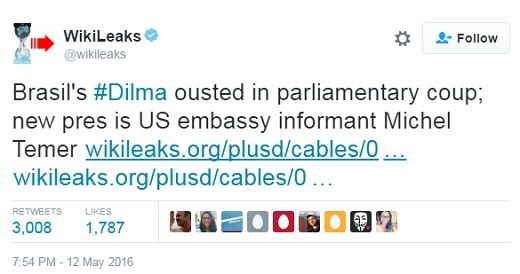Above Brazil’s Senate-imposed President Michel Temer gestures during a ceremony at the Planalto Palace in Brasilia, Brazil, May 12, 2016. Photo: Reuters
Senate-imposed President of Brazil Michel Temer met with U.S. Embassy staff on at least two occasions to brief them on the country’s politics.
Whistleblower website WikiLeaks described the Senate-imposed President of Brazil Michel Temer as a “U.S. Embassy informant” in a tweet and provided two links where Temer’s candid thoughts on Brazilian politics serve as the basis for a report by the U.S. embassy in Brazil.

The cable from Jan. 11, 2006, states that Temer met with embassy officials on Jan. 9, 2006 to give his assessment of Brazil’s political landscape ahead of the 2006 general election that saw Luiz Inacio Lula da Silva reelected to the presidency.
Temer became interim president after the Brazilian Senate voted to proceed with an impeachment trial against President Dilma Rousseff, forcing her to step down for a period of 180 days.
Temer has been criticized for making clear his intention of pursuing a pro-business, neoliberal program as president, despite the fact that Rousseff and her Workers’ Party were reelected on the basis of a progressive program of social investment and wealth redistribution.
The leaked cable indicates that Temer has always held a neoliberal outlook.
“Temer criticized Lula’s narrow vision and his excessive focus on social safety net programs that don’t promote growth or economic development,” reads the cable from Jan 11, 2006.
The cable also reveals that in 2006 Temer’s party, the PMDB, was considering an alliance with both the leftist Workers’ Party and the right-wing PSDB.
The PMDB’s tendency to switch sides would later prove to be a critical element in efforts by Brazilian elites to oust Rousseff.
Despite having been elected vice president alongside Rousseff, Temer betrayed his former allies and joined in efforts to oust the president via impeachment.
A June 21, 2006 cable shows Temer held a second meeting with U.S. embassy staff to once again appraise them on the political situation in Brazil.
In that cable Temer laments the lack of power given to PMDB ministers during the Lula government.
“Temer spoke caustically of the Lula administration’s miserly rewards for its allies in the PMDB,” reads the cable.
Temer’s bitterness over being left out of Rousseff’s governance decisions was said to be one of the factors that motivated his eventual support for her impeachment.
RELATED:
Coup Gov’t in Brazil to Implement Neoliberalism via Repression?
UNASUR Head Says Rousseff Remains ‘Legitimate Leader’ of Brazil

